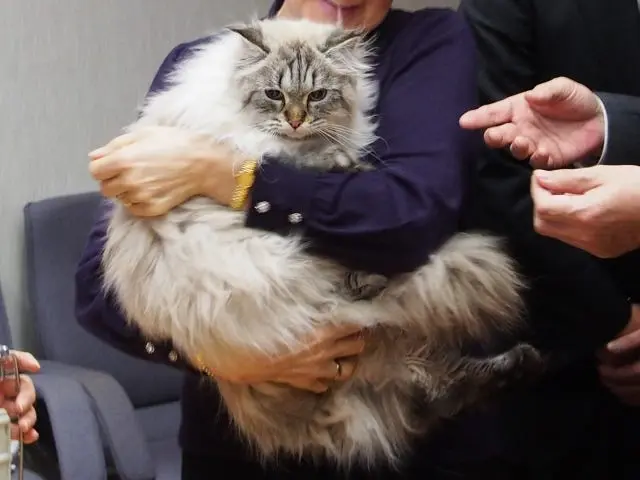In the realm of international diplomacy, we’ve seen everything from tense summits to symbolic gift exchanges. But rarely do such exchanges involve a cat whose life becomes a curious cross-cultural saga. Enter Mir, the Siberian feline gifted by Vladimir Putin to Akita Governor Norihisa Satake in 2013. A gesture of goodwill following Japan’s gift of an Akita dog to Russia, Mir’s life became a curious cross-cultural saga that outlasted most geopolitical accords.
Mir arrived here as a diplomatic gesture of gratitude. In 2012, following the Tohoku earthquake and tsunami, Japan gifted an Akita dog named Yume to Putin in appreciation for Russia’s support during the disaster. Putin, ever the strategist and self-proclaimed dog lover, reciprocated with Mir, a male Siberian cat. The exchange was both a nod to cultural camaraderie and a soft-power spectacle. Governor Satake, a noted cat enthusiast, named his new pet Mir, the Russian word for “peace,” underscoring the feline’s symbolic role.
Mir: A Mascot for a Rare Moment of Russo-Japanese Goodwill
For over a decade, Mir was more than a household pet; he was a mascot for a rare moment of Russo-Japanese goodwill. Satake often shared updates about Mir’s life, from his shy, gentle demeanor to his annual media appearances on Japan’s Cat Day, which is held on February 22. The governor’s affection for Mir added a personal touch to a story that might have otherwise been buried in diplomatic archives.
Not all the story, however, is as charming. While Mir thrived under Satake’s care, his canine counterpart Yume faded from public view in 2016, sparking speculation about her fate. The tale of Yume’s disappearance became an enigma, while Mir’s life continued to play out in the public eye.
Mir Passes Away
Tragically, Mir passed away on December 3, 2024, at the age of 12, succumbing to gastrointestinal lymphoma after months of declining health. The cat’s death was a symbolic moment for Satake, who used the occasion to express hopes for global peace — a sentiment mirrored in Mir’s name.
“I hope the Ukraine situation will settle down and the world will return to a peaceful state, just as Mir’s name signifies,” Satake remarked.
The aftermath of Mir’s passing took an odd diplomatic twist. On the day of his death, Akita Prefecture notified the Russian embassy of the news via email. At the time of writing, no response had been received, a silence that, intentional or not, reflects the broader chill in Russo-Japanese relations.
Mir’s story is a peculiar, but poignant reminder of the role animals can play in diplomacy. While they may not sign treaties or negotiate ceasefires, their presence — often innocent and apolitical — offers a softer, more humane side to international relations. Mir’s life as a quiet ambassador for peace — and his death as a symbol of fragile hopes — leaves behind a legacy that’s both heartwarming and bittersweet.









